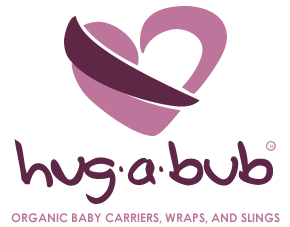Premature Infant Carers ...
... experience that even the tiniest premature infants can be safely held in a Hug-a-Bub, skin-to-skin, against a parent or carer's chest, (known as Kangaroo Care), helping to stabilise their heart and respiration rate, encourage weight gain and greatly lower mortality rate. Seek medical advice before carrying your premmie in any baby carrier, including Hug-a-Bub.
Physiotherapists -
... endorse Hug-a-Bub's ergonomic design because it reduces strain on shoulder, neck, and back muscles. Hug-a-Bub is officially endorsed by the Australian Physiotherapy Association. Physiotherapists have recommended Hug-a-Bub for those with some chronic back problems. "The width of the fabric allows the weight to be distributed over a larger area and the straps can be made very wide which makes it more comfortable to carry the baby. The baby can be very well supported in a flexed posture and when facing away, the baby has good trunk and leg support allowing excellent upper and lower limb movement. It is more difficult to position an older more active child. Safe and suitable if applied with care." Physio K. Herbert in Chris Barnes baby carrier review article for Choice magazine. (Note: Hug-a-Bub does not recommend parents face their baby away from them, as it is reduces the opportunity for neural-activating face to face interactions).
(Of the 10 carriers reviewed..)"Hugabub was most popular with mums with young babies, but many mums with older babies liked it too." was the conclusion of the Choice article.
Lactation Consultants ...
... favour the wide Hug-a-Bub wrap for discrete breastfeeding and the ability to breastfeed your baby horizontally or vertically. Ensure baby is repositioned in the safe upright position with face uncovered immediately after feeding. Babies should never be carried horizontally with face covered. Be careful to monitor baby whilst feeding, especially infants under 4 months of age.
Midwives And Childbirth Educators ...
... promote Hug-a-Bub for easing the transition for the baby from the womb to the world. It helps relax new mothers, promotes bonding and reduces post natal depression.
"A mother's... ligaments and muscles will take on average of 3 months post delivery to go back to her pre-pregnancy firmness, So the Hug-a-Bub protects and nurtures her, not to mention that by keeping the baby with her she reduces her own stresses and she can continue with her normal life style choices, while getting to know her Baby." Anne McLeod Taylor Midwife, Registered Nurse, Childbirth educator, Lactation Consultant Natural Therapist
Osteopaths And Chiropractors ...
... recognise that the width of Hug-a-Bub's fabric and the wrapping technique, ensure that the baby's weight is evenly balanced and supported by the whole torso and does not compress the baby's developing vertebrae.
"As an osteopath I can recommend with full confidence the use of the Hug-a-Bub baby carrier as a means of alleviating the stresses and strains all too frequently seen in my practice in mothers (particularly) with children of carrying age". Eve Schoenheimer D.O
Psychologists ...
... report that frequently carried infants experience the elements of motion, pleasure, warmth, security and a variety of stimulation that ensures their healthy physical, intellectual and social development.
Paediatricians And Early Childhood Nurses ...
... acknowledge that Hug-a-Bub greatly reduces crying and calms fussy or colicky babies.
" I find I can settle one baby in the Hug-a-Bub while attending to another, the babies are comfortable, relaxed and settle very quickly. It is easy to put the baby in and easy to take the baby out without disturbing them. Babies with Cerebral irritation, reflux and colic seem much more settled." Anne McLeod Taylor Midwife, Registered Nurse, Childbirth educator, Lactation Consultant Natural Therapist more
Occupational Therapists ...
... agree that many 'special needs' from which babies can benefit are created by the close physical contact provided by the Hug-a-Bub
Childcare Professionals ...
... use the Hug-a-Bub to settle babies. It's an instant way of calming them and making them feel secure in an unfamiliar environment.



